Posted by Anne Brunswic
Planche contact Palestine
published on : June 28, 2025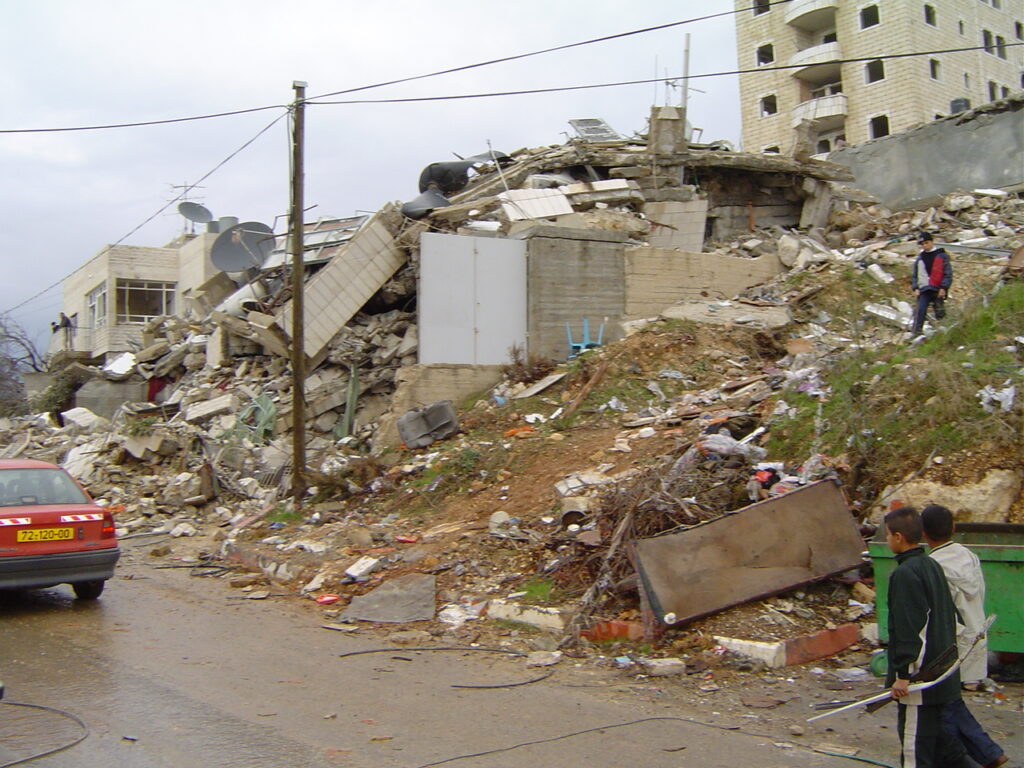
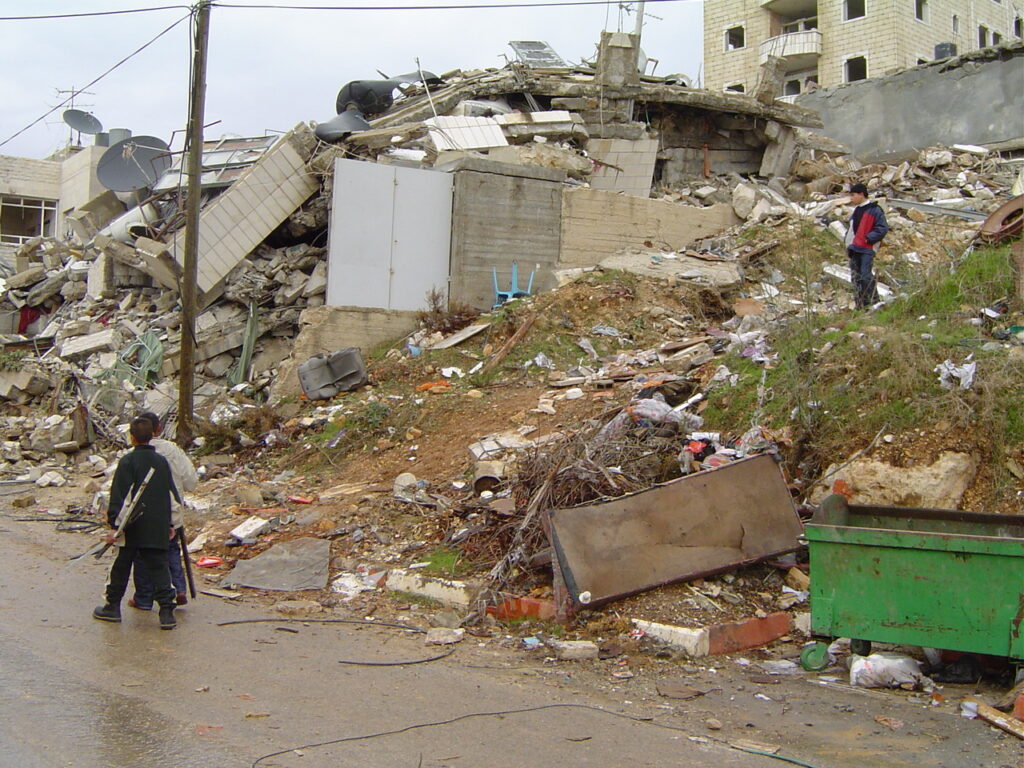
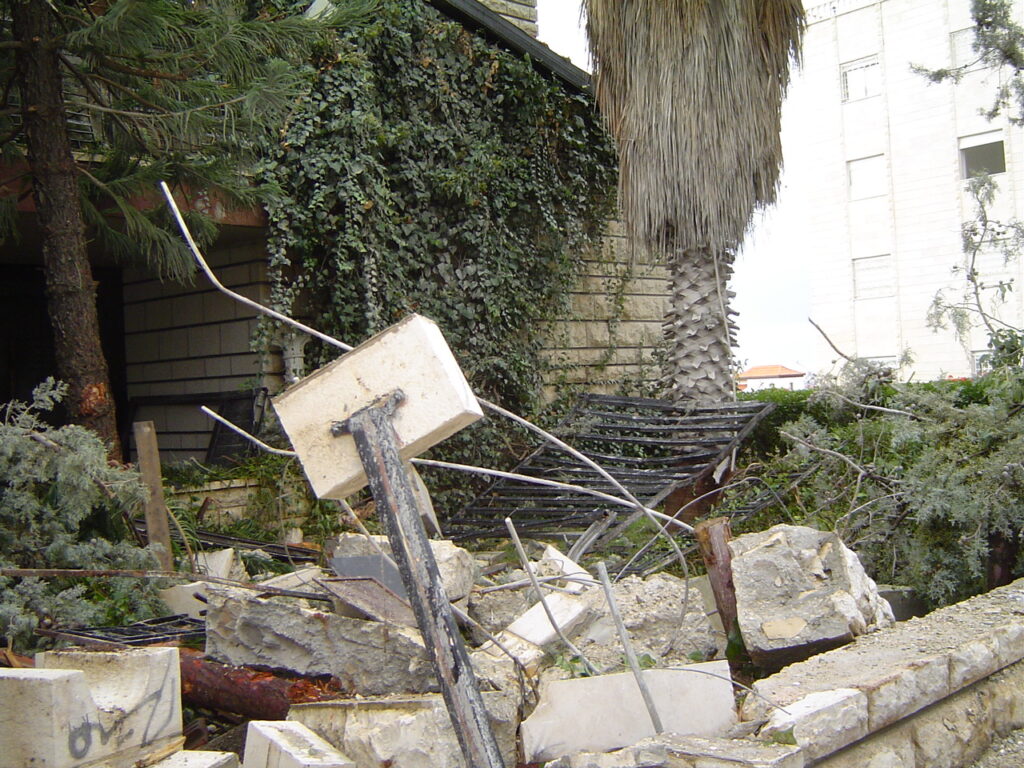

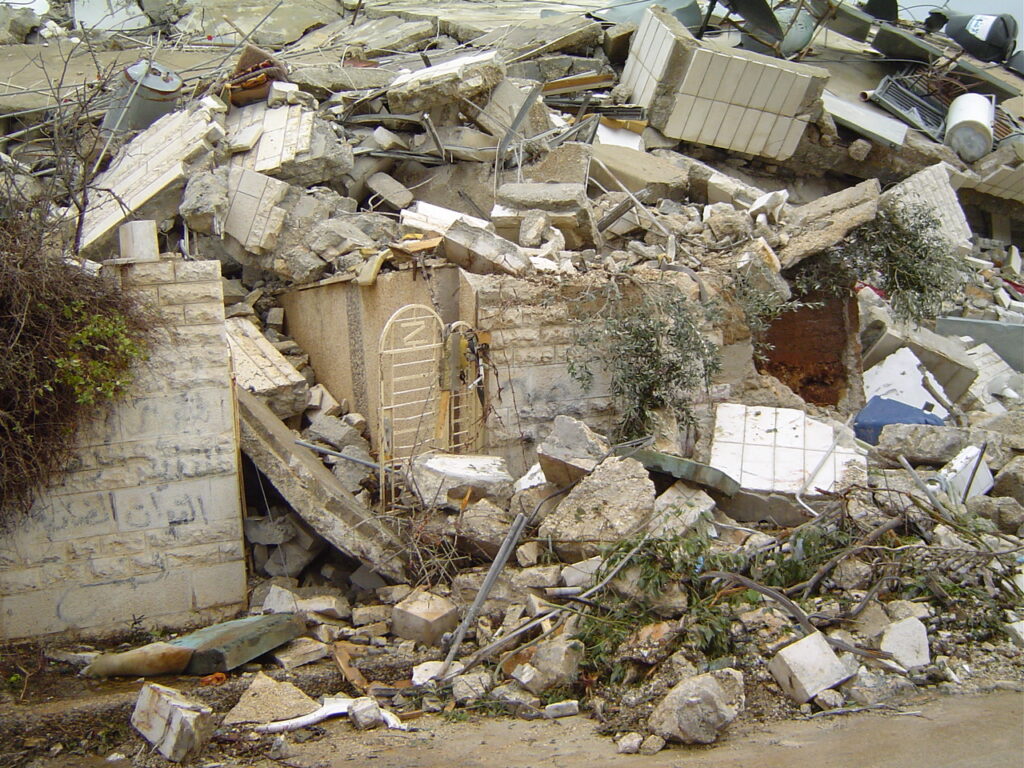
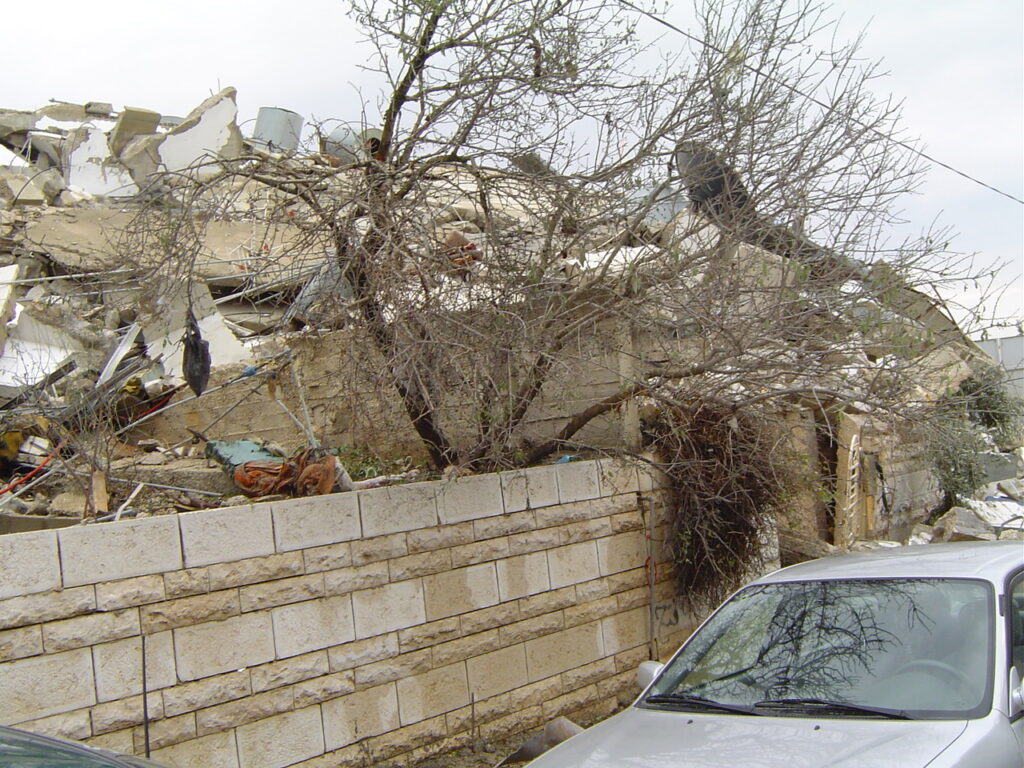
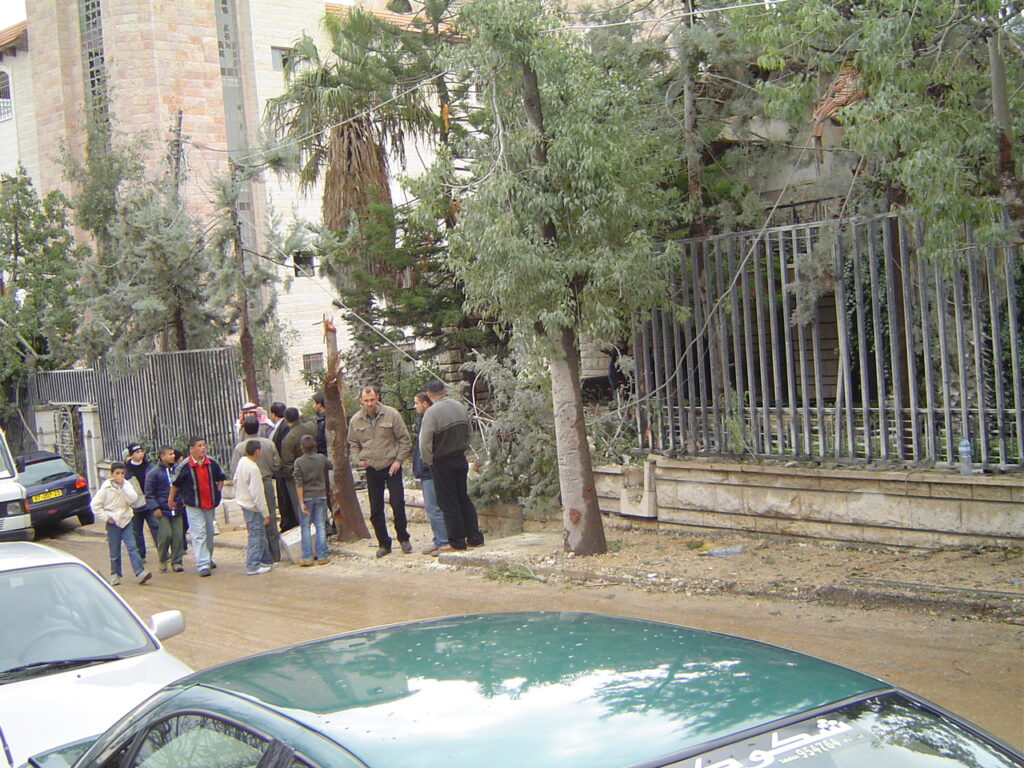

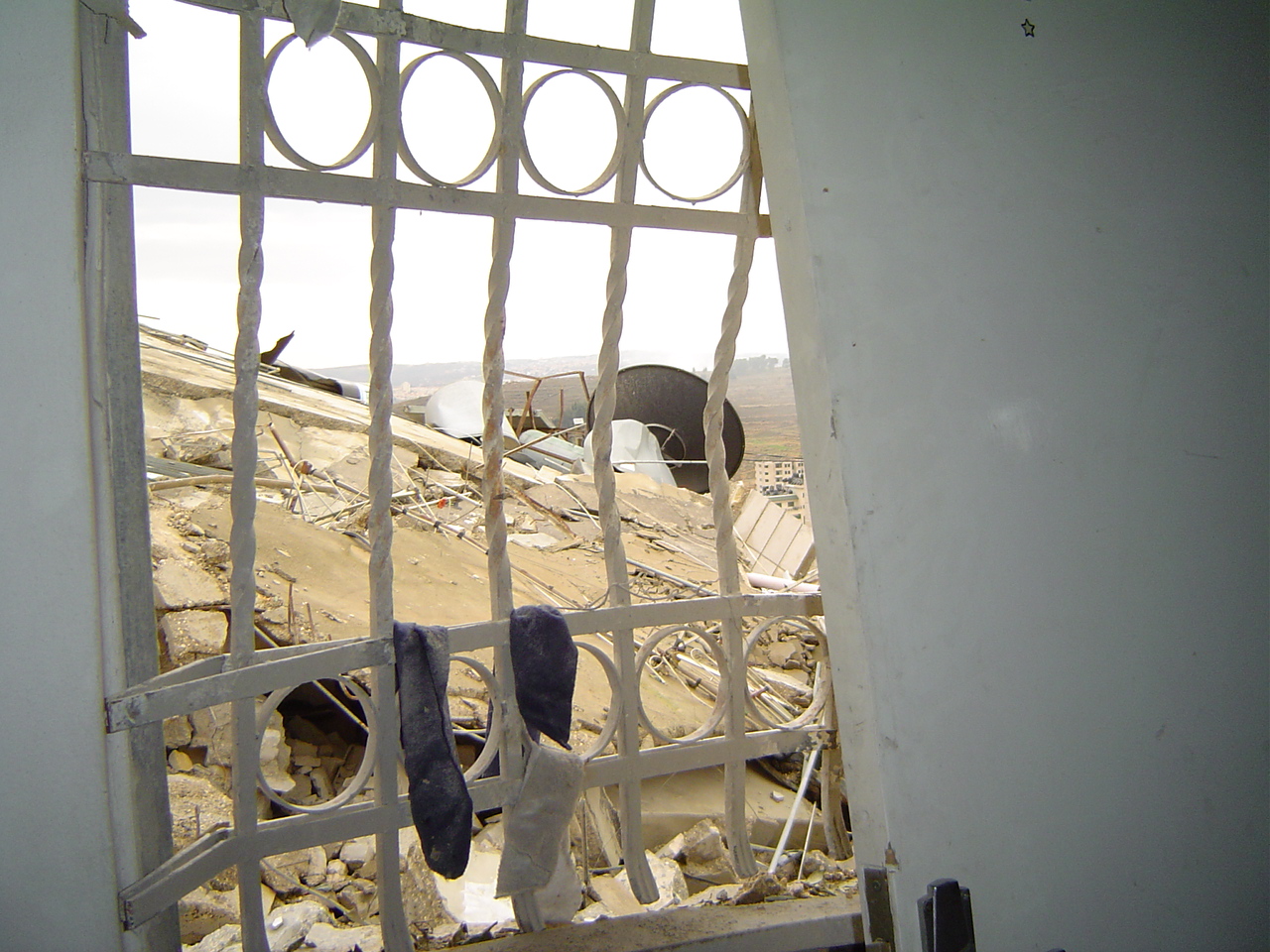



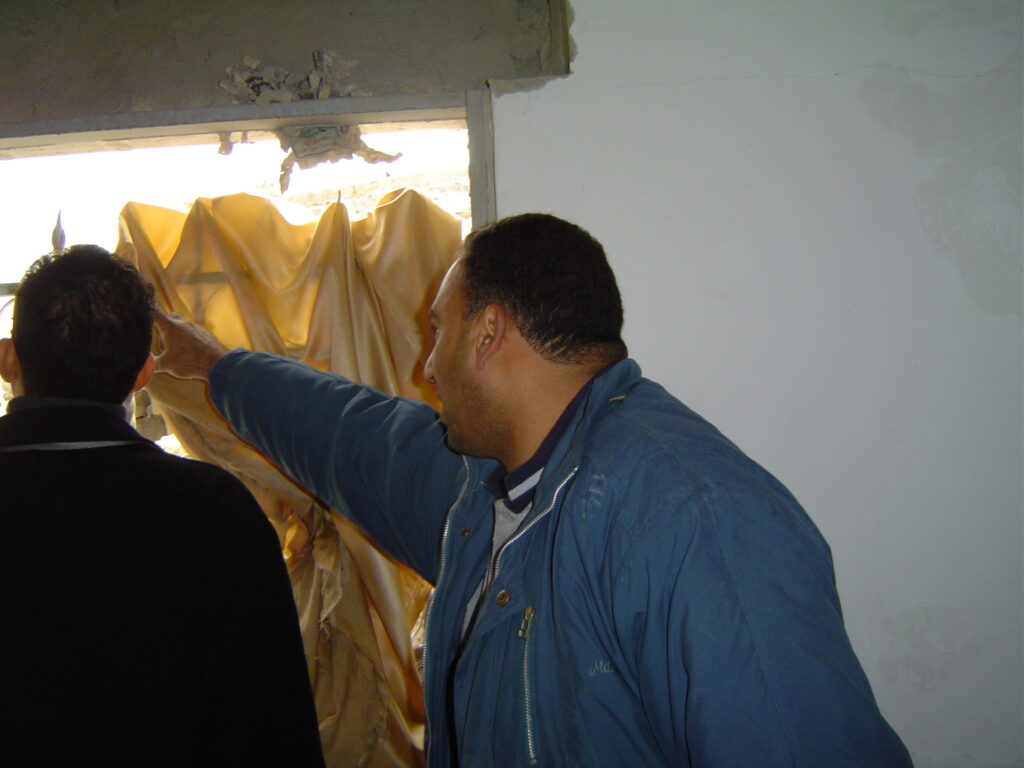
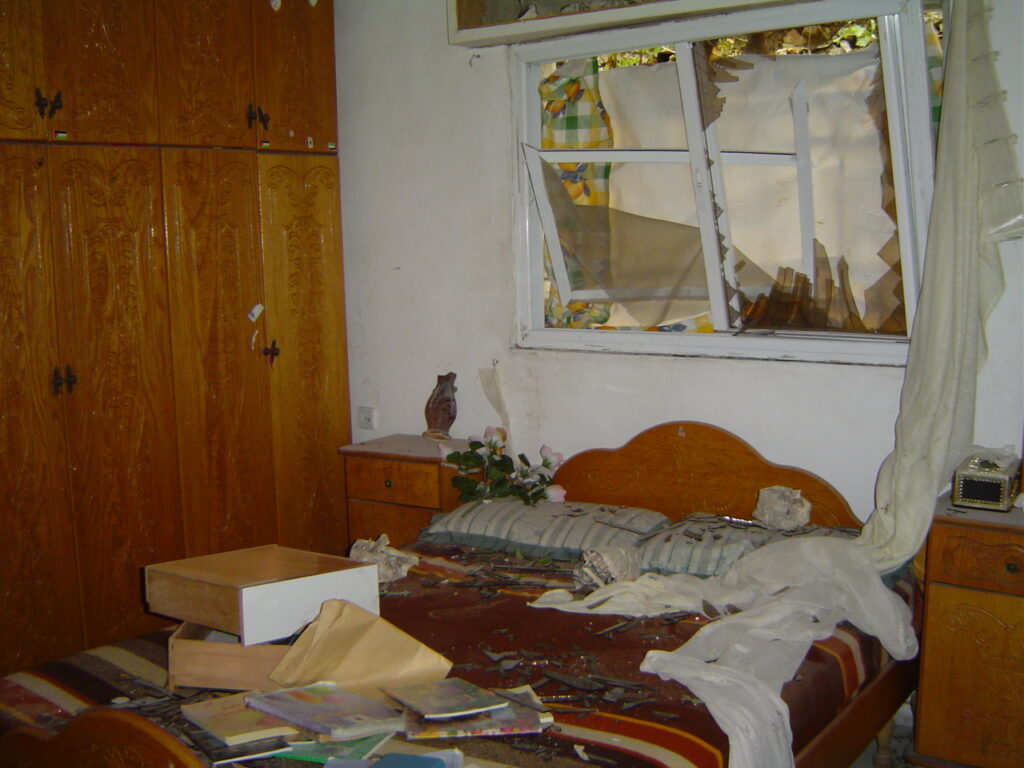

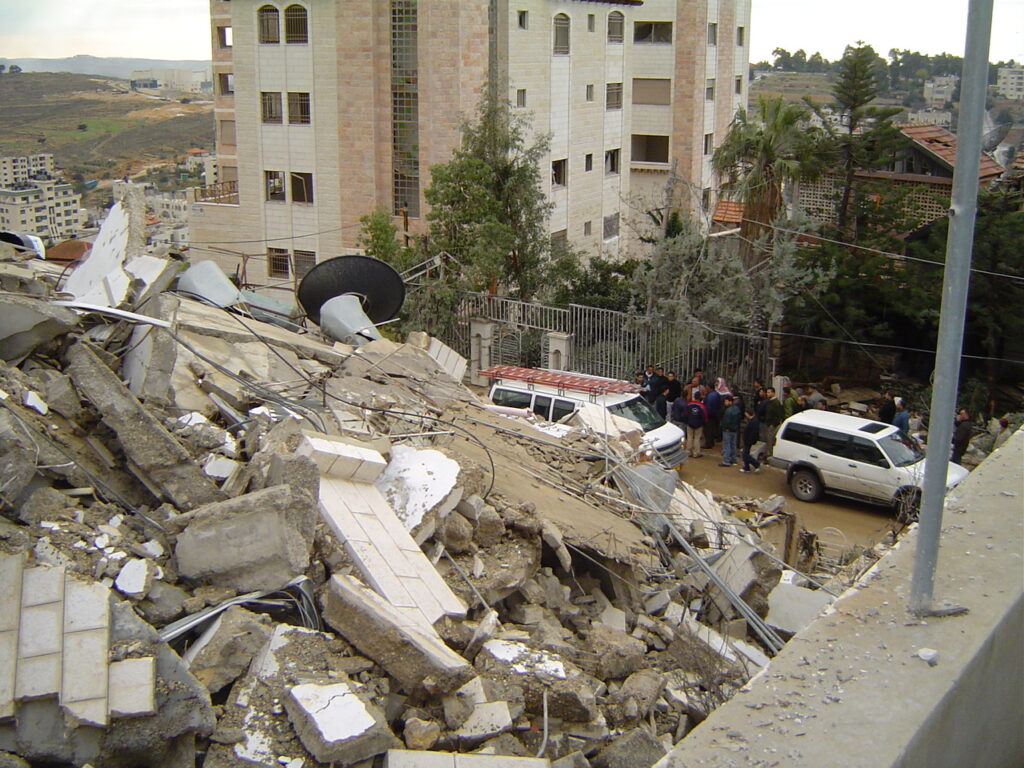

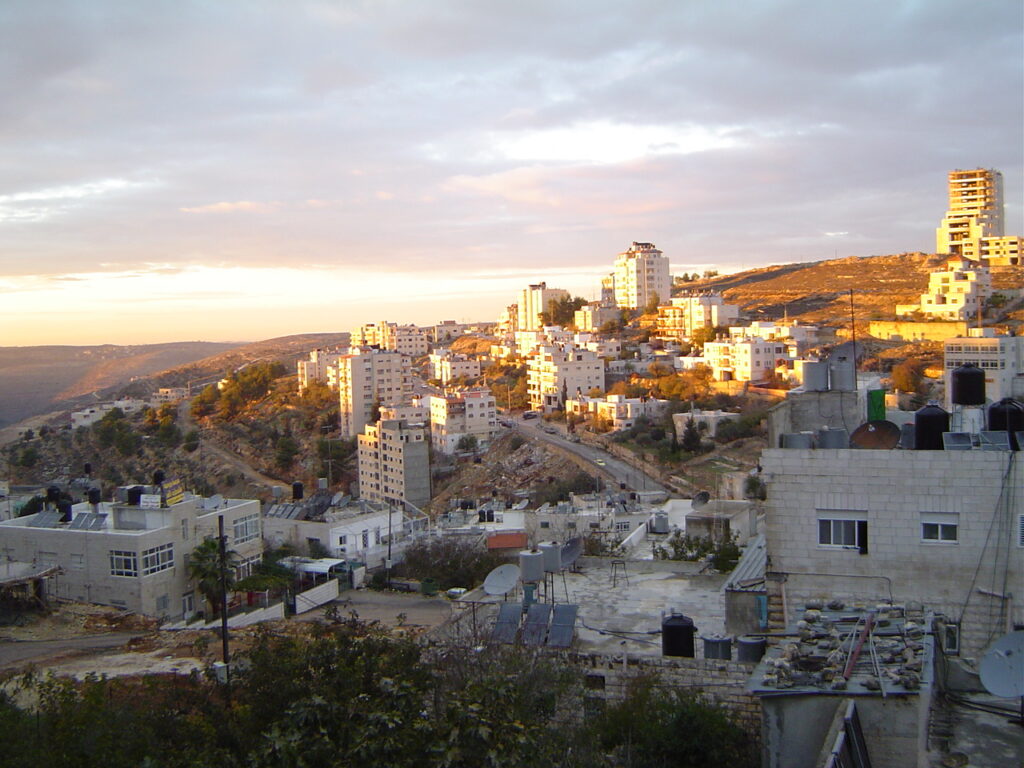
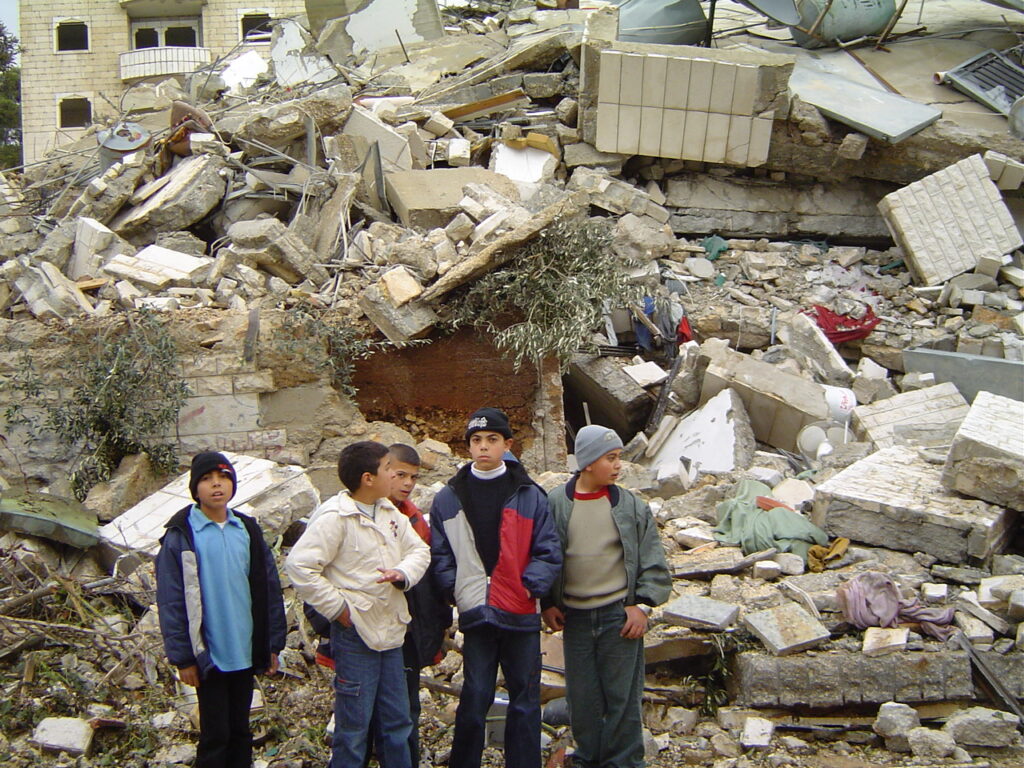
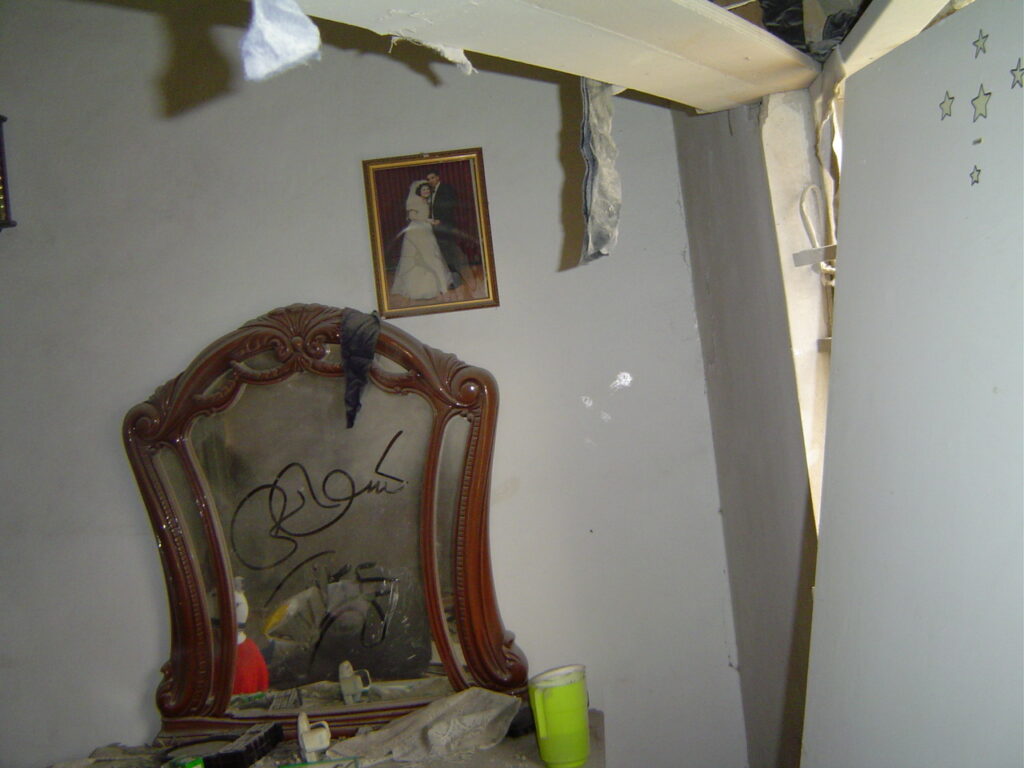
[English below]
Planche-contact
Le dossier « Photos Palestine 2003-2004 » est stocké dans un vieux disque dur rangé dans un placard inaccessible. Je ne l’ai pas ouvert depuis très longtemps. Ces photos m’ont servi de carnet de notes pour écrire mes chroniques de Ramallah. Elles n’avaient pas vocation à être publiées.
Aujourd’hui des images refont surface dans ma mémoire, un immeuble que l’armée israélienne vient de faire sauter, un groupe de garçons devant les ruines de leur maison, un miroir dans une chambre à coucher. Vingt ans ont passé. La mémoire est sélective, souvent trompeuse. Ramallah, près de l’église luthérienne, 2 décembre 2003. Dix-neuf prises de vue entre 15h07 et 15h30, 23 minutes en tout de DSC 577 à DCS 596. La photo de 16h26 numérotée DSC 597 est un coucher de soleil sur les collines de Ramallah. Apparemment, j’ai profité du fait que la pluie avait cessé pour me promener et me changer les idées.
Dans Bienvenue en Palestine (Actes Sud 2004), j’ai relaté fidèlement ce que j’ai vu le 2 décembre et ce que m’ont rapporté les témoins directs : ce sont six pages de reportage sur un immeuble dynamité. Récit factuel, aussi dépourvu d’émotion que possible. Les quarante habitants étaient collectivement punis parce que, selon les services de renseignements israéliens, l’un d’eux, on ne savait lequel, avait donné refuge pendant une nuit à “une cellule du Hamas”. Un jeune écrivain palestinien était à mes côtés pendant que je photographiais. Il était venu à contre-cœur, peu curieux de visiter une scène de crime si ordinaire. Il n’aimait pas la politique, il aurait préféré causer de Proust. Je le redécouvre en relisant mon livre, je l’avais tout à fait oublié, lui, son élégant pardessus et ses souliers fins souillés de boue. Je devrais lui être reconnaissante pour m’avoir ce jour-là servi d’interprète.
15h08. Zoom sur le garçon au bonnet bleu marine, le plus grand de la bande, regard fixe, lèvres serrées. Les autres semblent encore des enfants. Pour autant qu’on puisse interpréter une physionomie, je lis dans ses grands yeux sombres un concentré de désespoir et de rage, une haine pas près de s’éteindre. Je n’avais pas remarqué sa présence sur un cliché de 15h07 en haut à droite. Il est seul et observe en silence une maison qu’on croirait engloutie par un tremblement de terre. A ce moment précis, j’étais en train de cadrer les deux gamins au premier plan qui emportaient des bouts de ferraille et de tuyauterie.
Le garçon au bonnet bleu, s’il est toujours avec nous, doit avoir près de 33 ans. On peut supposer qu’il n’a rien oublié ni rien pardonné, qu’il a rêvé lui aussi de prendre une revanche. A moins que ses parents ne l’aient envoyé à l’étranger pour le tenir éloigné des spirales mortifères de la guerre. Dans ce quartier bourgeois à majorité chrétienne, beaucoup ont déjà émigré aux États-Unis.
15h13. Je me souviens d’avoir été invitée à monter dans un immeuble presque collé à celui qui venait d’être dynamité. L’onde de choc s’était propagée et une tempête semblait avoir dévasté l’appartement du premier étage. J’avais oublié la photo de mariage au-dessus du miroir de la coiffeuse et la mine résignée au malheur du chef de famille. Il devait s’estimer heureux d’avoir échappé au dynamitage. L’écrivain avait déchiffré pour moi le mot tracé sur le miroir : Kiswani. C’était le nom des propriétaires des deux immeubles.
A présent, je me souviens d’une photo que je n’ai pas prise : une fillette en robe rose m’avait conduite devant la porte de sa chambre jonchée de débris de verre et de plâtras tombés du plafond. Je n’avais pas voulu photographier le tas de poupées sur le lit, le cartable à fleurs, le petit écran vidéo brisé. Il y avait du viol dans le saccage de l’appartement, du viol dans cette chambre des parents ouverte à tous vents. Je ne voulais pas y ajouter du voyeurisme.
Contact sheet
The “Photos Palestine 2003-2004” folder is stored on an old hard drive in an inaccessible cupboard. I haven’t opened it for a very long time. I used these photos as a notebook to write my chronicles of Ramallah. They were not intended for publication.
Today, images resurface in my memory: a building that the Israeli army has just blown up, a group of boys standing in front of the ruins of their house, a mirror in a bedroom. Twenty years have passed. Memory is selective and often deceptive. Ramallah, near the Lutheran church, 2 December 2003. Nineteen shots were taken between 3.07pm and 3.30pm, 23 minutes in all from DSC 577 to DCS 596. The 16:26 photo numbered DSC00597 is a sunset over the hills of Ramallah. It seems I took advantage of the end of the rain to go for a walk and clear my head.
In Bienvenue en Palestine (Actes Sud 2004), I faithfully recounted what I saw on 2 December and what was reported to me by eyewitnesses: six pages of reportage on a dynamited building. A factual account, as devoid of emotion as possible. The forty residents were being collectively punished because, according to the Israeli intelligence services, one of them, it remained unclear which one, had given refuge for one night to ‘a Hamas cell’. A young Palestinian writer was by my side as I photographed. He had come reluctantly. He didn’t like violence, he would have preferred to talk about Proust. I rediscovered him when I reread my book; I had completely forgotten about him, his elegant overcoat and his fine mud-stained shoes. I should be grateful to him for acting as my interpreter that day.
3.08 pm. Zoom in on the boy in the navy blue cap, the tallest of the bunch, his eyes staring and his lips tight. The others still look like children. Insofar as you can interpret a face, I can read in his large dark eyes a concentration of despair and rage, a hatred that is not about to be extinguished. I hadn’t noticed his presence in a shot taken at 3.07pm in the top right-hand corner. He’s alone, silently watching a house that looks like it’s been engulfed by an earthquake. At that precise moment, I was framing the two kids in the foreground who were carrying away bits of scrap metal and pipes.
The boy in the blue cap, if he is still with us, must be nearly 33 years old. We can assume that he has forgotten nothing and forgiven nothing, that he too has dreamt of taking revenge. Unless his parents sent him abroad to keep him away from the deadly spirals of war. Many people in this predominantly Christian middle-class neighbourhood have already emigrated to the United States.
3.13 pm. I remember having been invited to go up to a building almost next door to the one that had just been blown up. The shockwave had spread and a storm seemed to have devastated the first-floor flat. I had forgotten about the wedding photo above the dressing table mirror and the look of resignation on the face of the head of the family. He must have considered himself lucky to have escaped the blast. The writer had deciphered the word on the mirror for me: Kiswani. This was the name of the owners of the two buildings.
Now I remember a photo I didn’t take: a little girl in a pink dress led me to the door of her room, which was strewn with broken glass and plaster from the ceiling. I didn’t want to photograph the pile of dolls on the bed, the flowered schoolbag and the broken video screen. There was rape in the ransacking of the flat, rape in the parents’ bedroom, which had been left wide open. I didn’t want to add voyeurism.
First published October 2023.
La permanence
published on : June 3, 2025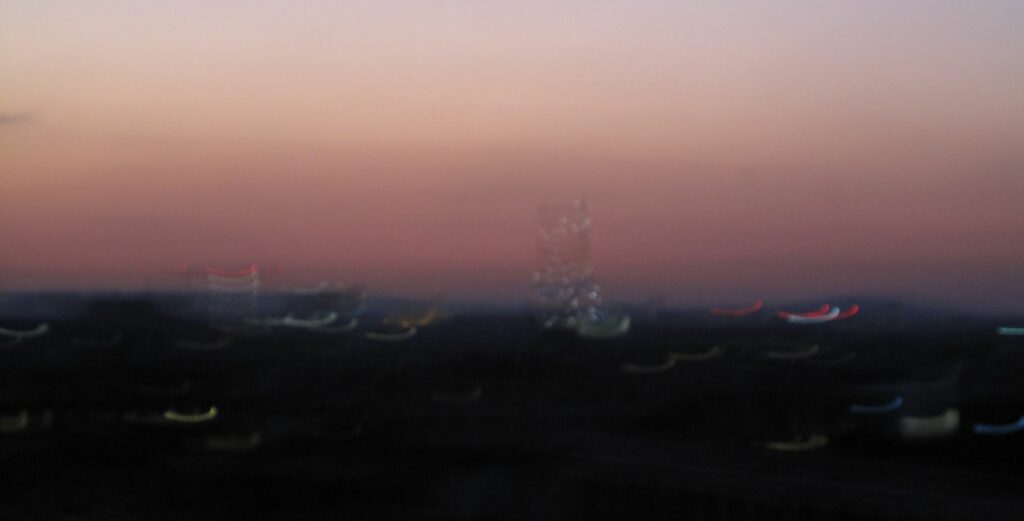
[English below]
Même décor. C’est l’été. La lumière est filtrée par de lourds rideaux rouges. Les examinateurs s’éventent de temps en temps. Une Africaine longiligne s’approche de la table. Elle est vêtue d’un long voile noir qui la couvre jusqu’à ses pieds chaussés de tongs. Sous le voile noir, un autre plus clair enserre son visage très fin. Elle tient un nourrisson dans ses bras et, de temps en temps, entrebâille son voile pour lui donner le sein. Malika vient de Mauritanie.
Malika : – L’avocat, j’appelle, il répond pas. C’est dans douze jours, la CNDA* (Cour nationale du droit d’asile), je sais pas quoi faire.
Les examinateurs en duo : – Il faut qu’on regarde ensemble la décision de rejet de l’OFPRA* (Office français des réfugiés et apatrides). (Ils lisent). Ils ne vous ont pas crue quand vous avez déclaré que vous avez subi un mariage forcé. Ils n’ont pas cru aux violences de votre mari. Ils croient plutôt que vous êtes partie parce qu’il a pris une seconde épouse. Ils rejettent tout ce que vous avez dit.
Malika : – Mais j’ai dit la vérité !
L’examinateur : – Quand votre père vous a annoncé que vous alliez être mariée avec votre cousin Suleiman, qu’est-ce que vous avez dit ? Comment vous avez réagi ?
Malika : – J’ai rien dit. La fille doit obéir. Une fille qui n’obéit pas, c’est le déshonneur. Le mariage, c’était décidé depuis que j’avais 5 ans. Mon père et mon oncle étaient d’accord.
L’examinateur : – Pourquoi vous ne vouliez pas épouser votre cousin Suleiman ?
Malika : – J’ai jamais voulu. Il fait rien, on l’envoie chercher du bois pour la cuisine, c’est tout. Il n’est pas beau, je l’aime pas, je l’ai jamais aimé.
L’examinateur : – Il est plus vieux que vous ?
Malika : – Un peu. Dix, douze ans, je crois. Il sait pas lire. Il ne sait rien, il gagne pas d’argent, les autres cousins, ils font du commerce, lui rien, il est juste là à rien faire, c’est les autres qui rapportent l’argent.
L’examinateur : – Avant votre mariage, vous alliez à l’école ?
Malika : – Oui, j’ai fini la primaire. Après, je voulais étudier pour être infirmière ou aide-soignante.
L’examinateur : – Votre mari ne vous a pas permis de continuer ?
Malika : – Quand on se marie, on quitte l’école. Mais c’est pas lui qui commande, c’est sa maman. Elle me déteste.
L’examinatrice : – A l’OFPRA, on vous a demandé de décrire la cérémonie de mariage et de raconter ce qui s’est passé après. Vous n’avez rien répondu.
Malika : – Il y a pas eu de cérémonie. On m’a lavée, habillée et on m’a mis un tissu blanc sur la figure, devant les yeux, je voyais rien. Et puis, on m’a poussée dans une petite maison que je connaissais pas. Il y avait une seule chambre. On reste enfermés. Tous les deux ensemble. On n’a pas le droit de sortir. Il y a une vieille qui surveille. Elle met la nourriture devant la porte. On sort seulement quand il y a la tache de sang sur le linge blanc.
L’examinatrice : – Votre mari a été brutal ?
Malika : – Pas brutal, il voulait pas me faire du mal. Il m’aimait, moi, je l’aime pas. Je lui ai dit depuis le début. Chaque fois qu’il approchait de moi sur le lit, je me levais et j’allais dans l’autre coin.
L’examinateur : – Comment ça se passe si le tissu n’est pas rouge. ?
Malika : – C’est le déshonneur. Après huit jours, des femmes entrent dans la chambre, elles t’attachent les mains et les pieds au lit. Comme ça (elle écarte les bras), les jambes sont écartées, alors elles coupent avec un rasoir. (Les deux examinateurs se regardent. Long silence.)
L’examinatrice : – Vous avez subi ça ?
Malika : – Non, après cinq jours, on l’a fait. On a décidé tous les deux. Pour ne pas avoir le déshonneur.
L’examinateur (d’une voix assourdie) : – Et après ? À l’OFPRA, on vous a demandé comment ça s’est passé après et vous n’avez rien répondu.
Malika : – C’est difficile à répondre. L’interprète, c’était un homme, j’arrivais pas à expliquer. Après, j’entre dans la maison de mon mari et là, tout de suite, il me pousse et il m’enferme dans une chambre. Pendant un mois, j’ai pas le droit de sortir. Jamais. Même pas dans la cour. Je mange dans la chambre.
L’examinatrice : – Lui, il a le droit de sortir ?
Malika : – Lui, il vient, il me force, il sort. Tous les jours, le matin et le soir, quand il a envie.
L’examinatrice : – Vous étiez juste un objet sexuel, c’est ça ? (Malika ne comprend pas bien. Elle donne le sein à son bébé.)
Malika : – Après, j’étais enceinte.
L’examinatrice : – On voit dans le dossier que votre premier enfant est né 10 mois après votre mariage et le deuxième plusieurs années plus tard. 2010 et 2016. Six ans. C’est beaucoup. Vous preniez la pilule ?
Malika : – Au village, il y a pas de pilules. Une vieille m’a donné une soupe. J’ai pris la soupe tous les soirs avant d’aller au lit. La casserole était cachée sous le lit.
L’examinatrice : – Vous avez fait des fausses couches ? (Silence. Malika ne comprend pas bien.) Vous avez perdu des bébés que vous attendiez ?
Malika : – Non, rien, il y a rien eu de spécial… Une fois.
L’examinateur : – À l’OFPRA, vous avez dit que votre mari était violent avec vous, qu’il vous battait. Ils trouvent que vos réponses sont vagues et confuses. Il vous battait ? Comment ça se passait ?
Malika : – Il y avait toujours des disputes. Je devais remonter 3 seaux d’eau pour la mère de mon mari et aussi pour ses deux sœurs. Moi, j’ai dit oui pour la maman, c’était obligé, mais non aux sœurs. J’ai dit je laverai jamais le linge de mon mari. Jamais ! Alors la maman disait à mon mari, il faut la corriger. Il me battait un peu, il faisait pas trop mal. Un jour, il a trouvé la casserole sous le lit. Là, il m’a vraiment battue, fort et devant tout le monde. Il m’a attachée comme ça et il a frappé avec un gros cordage. Comme ça ! (Elle montre ses épaules, son dos, ses cuisses.)
L’examinatrice : – Pourquoi vous ne vouliez pas d’enfants ?
Malika : – Pour la répudiation. Si t’as pas d’enfants, le mari te répudie. C’est le seul moyen de sortir de la maison. Mais après, quand il a vu la soupe sous le lit, il m’a battue terriblement après, il m’a enfermée tout un mois, j’étais malade, il m’a forcée tous les jours en me battant. Et là, j’ai été enceinte.
L’examinatrice : – Vous aimiez quelqu’un d’autre ?
Malika : – Oui, un peu, un peu, il y avait un garçon, on s’est vus au marché, il m’envoyait des messages et des photos sur Facebook.
L’examinateur : – Vous avez décidé de vous enfuir à cause de ce jeune homme ?
Malika : – Non, après, après. (Elle rit). C’est quand mon mari a pris une deuxième femme. J’étais pas jalouse, je voulais juste partir. Depuis le début, je voulais partir.
L’examinateur : – Vous avez dû laisser vos deux enfants derrière vous. C’était une décision difficile ?
Malika : – J’avais pas le choix. Il fallait partir. Autrement, j’allais mourir.
L’examinateur : – Vous avez des nouvelles des enfants ?
Malika : – Un peu. Je parle avec ma mère. Ils vont bien.
L’examinateur : – Vous venez d’avoir un nouveau bébé. Le papa, vous l’aimez ?
Malika : – Oh oui ! Il est très gentil.
L’examinateur : – C’est vous qui l’avez choisi ? Comment l’avez-vous rencontré ?
Malika : – On s’est rencontrés dans un camp en Italie, on s’est aimés tout de suite.
Les examinateurs, en duo : – On va préparer une lettre que vous donnerez à votre avocat. Il faudrait qu’il change ses arguments pour mieux vous défendre. Votre mari vous aimait et n’a jamais voulu vous faire vraiment de mal. Vous n’êtes pas partie à cause des violences. Depuis le premier jour, vous lui avez dit que vous ne l’aimiez pas, vous avez refusé de laver son linge, c’est très symbolique, et vous avez refusé de lui donner des enfants en espérant être répudiée, c’est le plus important.
Malika : – Mais qu’est-ce qu’il faut dire au tribunal ?
L’examinateur : – Dites la vérité. Mon mari n’était pas méchant mais je ne voulais pas vivre comme une esclave, je voulais être libre.
L’examinatrice : – Vous ne vouliez pas être violée chaque jour, vous ne vouliez pas être obligée de faire des enfants, vous ne vouliez pas être l’esclave de votre belle-famille.
L’examinateur : – Vous êtes venue en bateau par la Libye ?
Malika : – Avec le Zodiac. J’ai eu très peur. Il y a des enfants qui sont tombés dans l’eau. Après, sur le bateau italien, ça allait. Vous croyez que je vais avoir des papiers ?
L’examinatrice : – Avec un peu de chance, la CNDA comprendra que vous ne vouliez pas rester dans l’esclavage.
Weekly reception. Malika.
Same setting. It’s summer. The light is filtered through heavy red curtains. The examiners fan themselves from time to time. A lanky African woman approaches the table. She is dressed in a long black veil that covers her down to her feet. She is wearing flip–flops. Beneath the black veil, another ligt–coloured one encircles her thin face. She is holding an infant to her chest and, from time to time, opens her veil to give it her breast. Malika is from Mauritania.
Malika: – I call the lawyer, but he doesn’t answer. It’s in twelve days, the CNDA* (National Asylum Court), I don’t know what to do.
The examiners in duet: – We need to look at the OFPRA* (French Office for Refugees and Stateless Persons) rejection decision together. (They read). The OFPRA officer did not believe you when you said you had been subjected to a forced marriage. He didn’t believe that your husband was violent. Instead, OFPRA suggests that you left because he took a second wife. OFPRA does’nt believe what you said.
Malika: – But I told the truth!
Man examiner: – When your father told you that you were going to be married to your cousin Soleman, what did you say? How did you react?
Malika: – I didn’t say nothing. A daughter must obey. A girl who doesn’t obey, the family is dishonoured. My marriage was planned since I was 5. My father and my uncle agreed.
Man examiner: – Why didn’t you want to marry your cousin Soleman?
Malika: – I never wanted to. He doesn’t do anything, we just send him out to fetch wood for the kitchen, that’s all. He’s not handsome, I don’t like him, I’ve never liked him.
Man examiner: – Is he older than you?
Malika: – A bit. Ten, twelve years, maybe. He can’t read. He doesn’t know anything, he doesn’t earn any money, the other cousins do business, he doesn’t do anything, he’s just there doing nothing, it’s the others who make the money.
Man examiner: – Before you got married, did you go to school?
Malika: – Yes, I finished primary school. After that, I wanted to study to be a nurse or care assistant.
Man examiner: – Didn’t your husband allow you to continue?
Malika: – When you get married, you leave school. But he’s not in charge, his mum is. She hates me.
Woman examiner: – At OFPRA, you were asked to describe the wedding ceremony and what happened afterwards. You gave no answer.
Malika: – There was no ceremony. They washed me, dressed me and put a white cloth over my face, over my eyes, I couldn’t see a thing. Then I was pushed into a little house I didn’t know. There was only one room. We were locked in. The two of us together. We weren’t allowed out. There’s an old woman watching. She leaves the food outside the door. We only get out when there’s a bloodstain on the white linen.
Woman examiner: – Was your husband brutal?
Malika: – He wasn’t brutal, he didn’t want to hurt me. He loved me, but I don’t love him. I told him from the start. Every time he came near me on the bed, I got up and went to another corner.
Woman examiner: – What happens if the fabric isn’t red?
Malika: – It’s dishonour. After eight days, some women come into the room and tie hands and feet of the girl to the bed. Like this (she spreads her arms), the legs are spread, so they cut you with a razor. (The two examiners look at each other. Long silence.)
Woman examiner: – Did you go through this?
Malika: – No, after five days, we did it. We both decided. So as not to be dishonoured.
Man examiner (in a muffled voice): –And then what? OFPRA asked you what happened afterwards and you didn’t say.
Malika: – It was difficult to answer. The interpreter was a man, so I couldn’t explain. Afterwards, I went into my husband’s house and he immediately pushed me out of the way and locked me in a room. I wasn’t allowed out for a month. I was never allowed out. Not even in the courtyard. I eat in the room.
Man examiner: – Was he allowed to go out?
Malika: – He comes, he forces me, he goes out. Every day, in the morning and in the evening, whenever he feels like it.
Woman examiner: – You were just a sex object, weren’t you? (Malika doesn’t quite understand. She’s breastfeeding her baby.)
Malika: – Then I got pregnant.
Woman examiner: – The file shows that your first child was born 10 months after your marriage and the second several years later. 2010 and 2016. That’s six years. That’s a long time. Were you on the pill?
Malika: – There’nt no pills in the village. An old woman provided me a soup. I took the soup every night before going to bed. It was hidden under the bed.
Woman examiner: – Have you had any miscarriages? (Silence. Malika doesn’t quite understand.) Have you lost a baby when you were expecting?
Malika: – No, nothing special… Once.
Man examiner: – At OFPRA, you said that your husband was violent with you, that he beat you. They found your answers vague and confused. He beat you? How did that work?
Malika: – There were always arguments. I had to fetch 3 buckets of water for my husband’s mother and also for his two sisters. I said yes for the mum, it was a must, but no to the sisters. I said I would never wash my husband’s laundry. I’d never do it! So his mum said to my husband “you’ve got to straighten her out”. He beat me a bit, but it didn’t hurt too much. One day, he found the soup pot under the bed. That’s when he really beat me, hard and in front of everyone. He tied me up like this and hit me with a big rope. Like this! (She shows her shoulders, back and thighs).
Woman examiner: – Why didn’t you want children?
Malika : – For repudiation. If you don’t have children, your husband will repudiate you. It’s the only way to get out. But after he saw the soup under the bed, I was locked up for a whole month, I was ill, he forced me every day by beating me and then I got pregnant.
Woman examiner: – Did you like anyone else?
Malika: – Yes, a little, a little, there was a boy, we saw each other at the market, he was sending me messages and photos on Facebook.
Man examiner: – Did you decide to run away because of this young man?
Malika: – No, later, later. (She laughs). It was when my husband took a second wife. I wasn’t jealous, I just wanted to leave. I wanted to leave from the start.
Man examiner: – You had to leave your two children behind. Was that a difficult decision?
Malika: – I had no choice. I had to leave. Otherwise, I am going to die.
Man examiner: – Have you heard anything about the children ?
Malika: – A bit. I’m talking to my mother. They’re ok.
Man examiner: – You’ve just had a new baby. Do you like its dad?
Malika: – Oh yes, he’s very nice.
Man examiner: – Did you choose him? How did you meet him?
Malika: – We met in a camp in Italy and fell in love straight away.
The examiners, in duet: – We’re going to prepare a letter for you to give to your lawyer. He needs to change his arguments to defend you better. Your husband loved you and never really wanted to hurt you. Violence is not why you left. From day one, you told him that you didn’t love him, you refused to wash his clothes – that’s very symbolic – and you refused to give him children in the hope of being repudiated – that’s the most important thing.
Malika: – But what do you tell the court?
Man examiner: – Tell the truth. My husband wasn’t a bad man, but I didn’t want to live like a slave, I wanted to be free.
Woman examiner: – You didn’t want to be raped every day, you didn’t want to be forced to have children, you didn’t want to be your in–laws’ slave.
Man examiner: – You came by boat from Libya?
Malika: – The Zodiac. I was very scared. Some children fell in the water. After that, it was fine on the Italian boat. Do you think I’ll get permit?
Woman examiner: – With a bit of luck, the court will understand that you didn’t want to remain in slavery.
First published August 2022.
This is not a wall
published on : May 21, 2025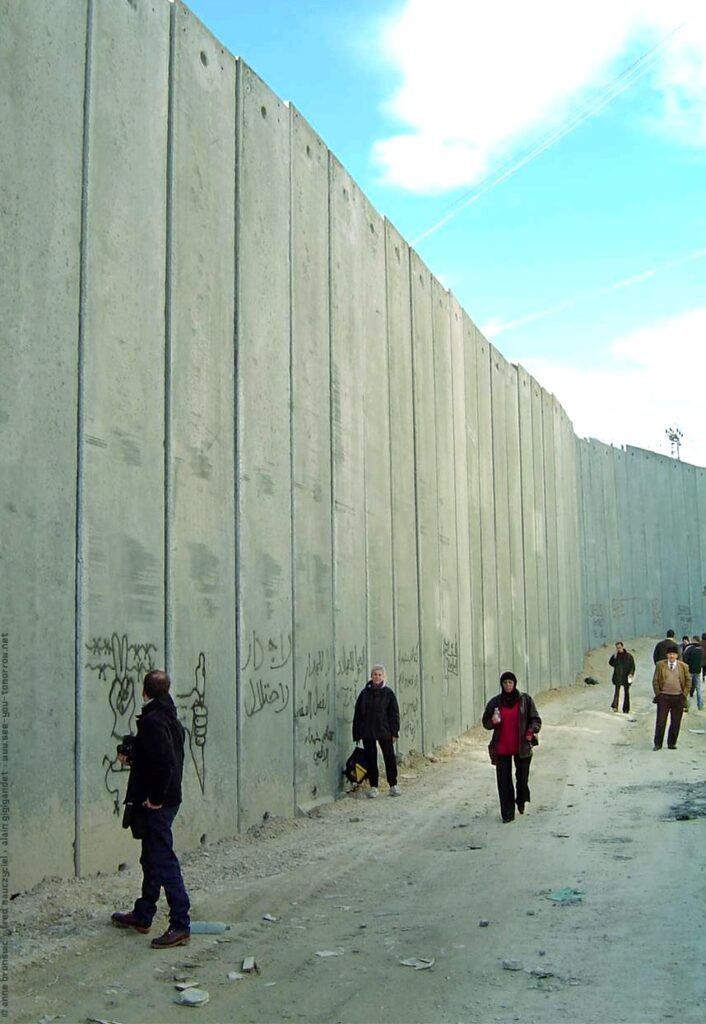
[English below]
CECI N’EST PAS UN MUR. La chose tient de la Grande Muraille de Chine, de l’enceinte d’une villa dans la jungle, du jeu de Lego. Il est devenu un terrain de jeu pour street-artist.
La construction de ce qui fut dénommé par euphémisme « barrière de séparation » débuta en 2002. Le but avoué de ses promoteurs était de mettre fin aux incursions violentes des barbares. Tout comme les empereurs de Chine du deuxième millénaire avant notre ère. Tout comme les empereurs romains du IIe siècle. Son tracé sinueux, plein de boucles et de replis, courait sur la carte à travers les collines et les oliveraies, les villes et les déserts de Cisjordanie. “Judée-Samarie” dans la toponymie des promoteurs. En englobant les principales cités de colonisation bâties chez les voisins, la “barrière” servait un dessein moins avouable, l’annexion de quelques centaines de kilomètres carrés supplémentaires aux alentours de Jérusalem. Au cours des mois d’automne et d’hiver que j’ai passés là-bas en 2003-2004, les portions bétonnées en zone urbaine étaient encore en chantier. J’ai pu les observer à Ramallah, Jérusalem Est, Tulkarem, Bethléem, Qalqilya…
Le procédé est ingénieux. Le module principal est un panneau de béton préfabriqué aux dimensions standardisées – hauteur 9 mètres, largeur 1,20 m, épaisseur 0,80 m – percé aux extrémités de larges trous. Poids : 30 tonnes peut-être, je n’ai pas pu vérifier. La base du panneau se loge dans une tranchée peu profonde. Les panneaux sont accolés les uns aux autres sans jointure. Le crochet de la grue se glisse dans le trou supérieur et le grutier n’a plus qu’à déposer délicatement la pièce dans la tranchée. Simple comme un Lego. Les nombreuses tourelles servant à la fois de miradors, de fortins et de postes de surveillance électronique qui jalonnent l’ouvrage sont, elles aussi, préfabriquées et livrées en kit.
Il convient que les bâtiments les plus proches soient distants d’au moins 80 mètres et que leur hauteur n’excède pas deux niveaux de façon à ce que personne, même perché sur un toit et juché sur une échelle, ne puisse jouer au sniper. Le terrain était préalablement dénudé, les cultures arrachées, les serres détruites. Les bulldozers pulvérisaient une ou deux rues, les pelleteuses formaient des tas de gravats qui, je suppose, étaient ensuite dispersés dans les champs environnants. Les engins nivelaient, aplanissaient puis le terrain était recouvert de sable ou de gravillons. En une semaine, j’ai vu un quartier densément peuplé avec ses arbres et ses jardins changé en un tronçon d’autoroute lunaire. On pouvait encore voir sur les côtés la moitié d’une pharmacie éventrée, les ruines d’un café, des orangers abattus.
Pour faire passer au centre de villes bâties à flanc de colline des camions de très gros tonnage, il faut élargir les rues. Cela imposait de nouvelles démolitions et des expulsions en grand nombre. Les indigènes expropriés ne recevaient aucune indemnité. Des graffitis, des banderoles de protestation exprimaient en silence la colère générale. Les soldats patrouillaient autour du chantier et dans toute la ville, prêts à écraser toute velléité de rébellion.
Montage et démontage faciles. Rapidité, simplicité, économie de matériel et de main d’œuvre. Le chantier ne mobilisait que des conducteurs d’engins et des soldats. Les concepteurs de cette palissade modulable paraissaient avoir anticipé le jour où son tracé s’enfoncerait plus avant dans la chair du barbare. Pour eux, les frontières avaient toujours été des réalités élastiques.
A y regarder de plus près, ce mur qui n’est pas un mur est un garrot.
THIS IS NOT A WALL. It’s something like the Great Wall of China, the walls of a villa in the jungle, or a Lego game. It has become a playground for street artists.
Construction of what was euphemistically called the ‘separation barrier’ began in 2002. The avowed aim of its promoters was to put an end to violent incursions by barbarians. Just like the emperors of China in the second millennium BC. Just like the Roman emperors of the second century.
Its winding line, full of loops and folds, ran on the map through the hills and olive groves, towns and deserts of the West Bank. ‘Judea-Samaria’ in the promoters’ toponyms. By encompassing the main settlements built by its neighbours, the ‘barrier’ served a less avowed purpose: the annexation of a few hundred more square kilometres around Jerusalem. During the autumn and winter months I spent there in 2003-2004, the concrete sections in the urban areas were still under construction. I saw them in Ramallah, East Jerusalem, Tulkarem, Bethlehem, Qalqilya…
The process is ingenious. The main module is a prefabricated concrete panel with standardised dimensions – height 9 metres, width 1.20 m, thickness 0.80 m – pierced at the ends by large holes. Weight: 30 tonnes approximately, I wasn’t able to check. The base of the panel is set in a shallow trench. The panels are joined together seamlessly. The crane hooks into the top hole and all the crane operator has to do is carefully place the piece in the trench. Simple as Lego. The many turrets that are used as watchtowers, forts and electronic surveillance posts throughout the structure are also prefabricated and delivered in kit form.
The nearest buildings must be at least 80 metres apart and no more than two storeys high, so that no-one can play the sniper, even if they are on a roof perched on a ladder. Beforehand, the land was stripped bare, the crops uprooted and the greenhouses destroyed. The bulldozers pulverised one or two streets, the diggers formed piles of rubble which, I suppose, were then scattered in the surrounding fields. The machines levelled and smoothed the ground and then covered it with sand or gravel. In the space of a week, I saw a densely populated area with trees and gardens turned into a lunar stretch of motorway. Half a gutted pharmacy, the ruins of a café and felled orange trees could still be seen on the sides.
To allow very large trucks to pass through the centre of cities built on a hillside, the streets needed to be widened. This meant further demolitions and large-scale evictions. The expropriated natives received no compensation. Graffiti and protest banners silently expressed the general anger. Soldiers patrolled the site and the whole town, ready to crush any hint of rebellion.
Easy to assemble and dismantle. Quick, simple, saving on materials and manpower. All that was needed on site were machine operators and soldiers. The designers of this modular palisade seemed to have anticipated the day when its line would penetrate further into the flesh of the enemy. For them, borders had always been elastic realities.
On closer inspection, this wall is a garrot.
First published in 2021. New edition.
From my window
published on : April 1, 2025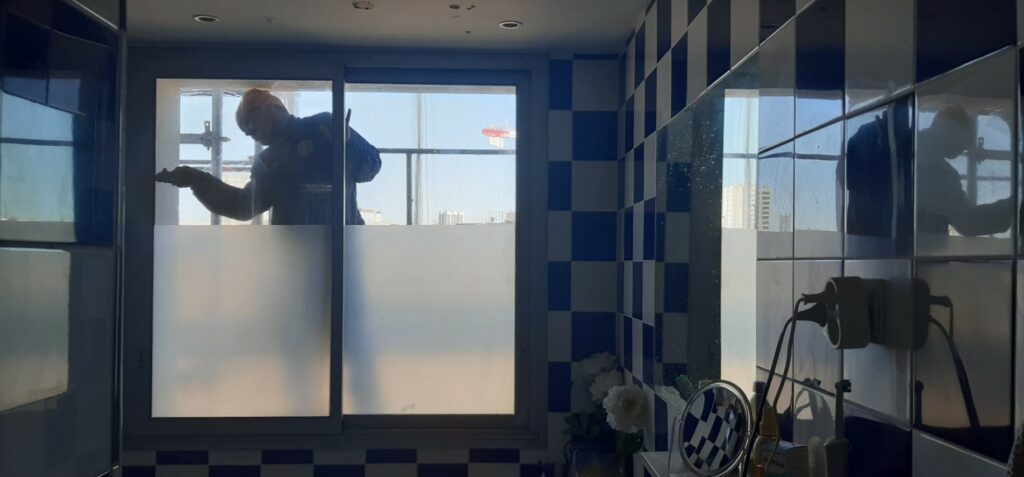
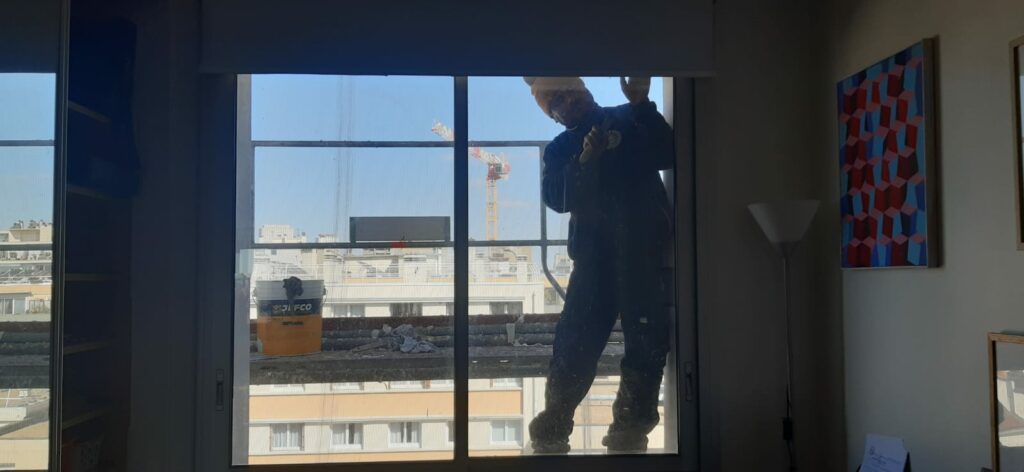
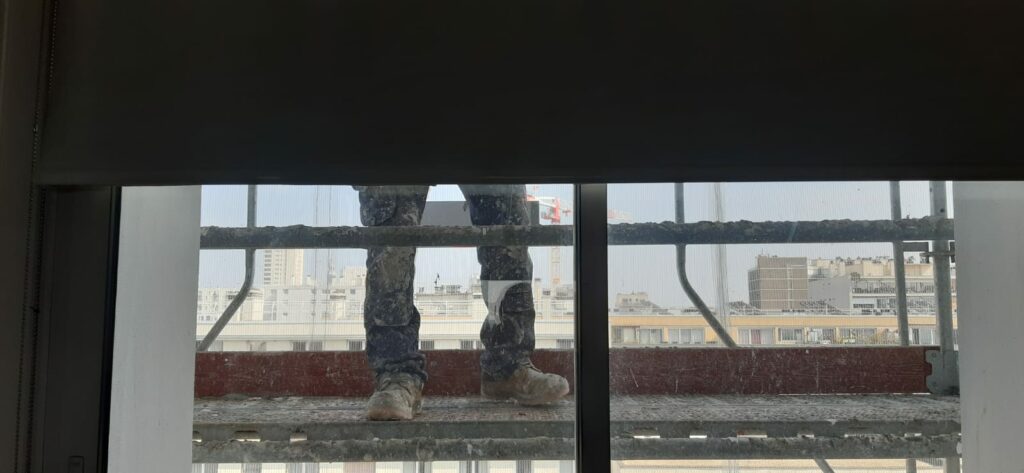
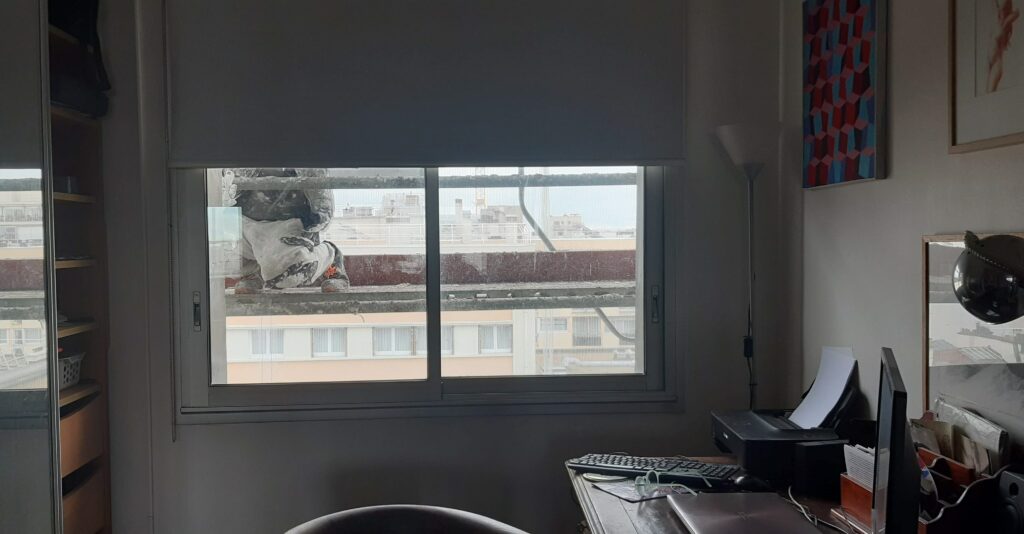
De ma fenêtre
Les premières photos de mes fenêtres datent du début du confinement, avril 2020, qui fut aussi le début de l’aventure collective de The Crown Letter. Cinq ans ont passé. Des centaines d’événements ont été qualifiés d’historiques. L’histoire en retiendra-t-elle quelque chose ? Vu de ma fenêtre, le ciel paraît aujourd’hui gros de nuages très noirs. Des calamités en tout genre s’annoncent. En remontant le temps, cette page témoigne d’événements dont certains seront peut-être jugés mineurs mais qui m’ont personnellement touchée voire bouleversée, parmi eux le grand enfermement du Covid, le soulèvement démocratique des Biélorusses, la persécution de Julian Assange, la condamnation à 15 ans de détention à régime sévère d’un ami russe militant de la mémoire des victimes du stalinisme, Iouri Dmitrievitch, les centaines de milliers d’exilés venus frapper aux portes barricadées de notre continent, le basculement de l’Argentine dans l’ère de la tronçonneuse, l’agression militaire de l’Ukraine et, pire que cette guerre menée par un empire sur le déclin, l’anéantissement méthodique de tout le peuple palestinien par un État se proclamant juif qui m’est familier depuis l’enfance pour avoir incarné l’idéal de beaucoup de mes proches et m’inspire aujourd’hui une horreur mêlée de honte.
Cette page témoigne de ma petite histoire percutée par la grande. Je n’ai cessé de regardé au dehors. La restauration complète de la façade sur cour sera bientôt achevée. Douze étages de 30 mètres de large représentent une surface conséquente que je n’ai pas calculée. Les ouvriers sont tous originaires du Maghreb ou d’Afrique francophone. Ils ont beaucoup peiné cet hiver sur leur échafaudage exposé au vent glacial. Le printemps est enfin arrivé et le ramadan a fini dimanche. Cet après-midi, je leur ai servi un café chaud et bien sucré. Ils ont souri comme si le monde tournait rond.
From my window
The first photos of my windows date from the beginning of the lock-down, April 2020, which was also the beginning of the collective adventure of The Crown Letter. Five years have passed. Hundreds of events have been named as historic. Will history remember anything of it?
Seen from my window, the sky today looks heavy with dark clouds. Calamities of all kinds are on the horizon.
Turning back time, this page bears witness to events, some of which may be considered minor, but which have touched me personally, even shaken me, including the great lockdown of Covid, the democratic uprising in Belarus, the persecution of Julian Assange and the sentencing to 15 years’ harsh imprisonment of a Russian friend and campaigner for the memory of the victims of Stalinism, Yuri Dmitrievich, the hundreds of thousands of exiles who have come to knock on the barricaded doors of our continent, the tipping of Argentina into the era of the chainsaw, the military aggression against Ukraine. And, worse than this war waged by an empire in decline, the methodical annihilation of the entire Palestinian people by a state proclaiming itself to be Jewish, this state having been familiar to me since childhood, having embodied the ideals of many of my relatives, and which today fills me with a horror mingled with shame.
This page bears witness to my own little history, in collisions with the large. I’ve never stopped looking outside.
The complete restoration of our courtyard façade will soon be complete. Twelve 30 metre wide storeys represent a substantial surface area, of which I haven’t calculated. The workers are all from North Africa or French-speaking Africa. They struggled a lot this winter on their scaffolding exposed to the icy wind. Spring has finally arrived and Ramadan ended last Sunday. This afternoon, I served them a hot, sweet coffee. They smiled as if the world were turning round.
Does seeing make a difference ?
published on : February 10, 2025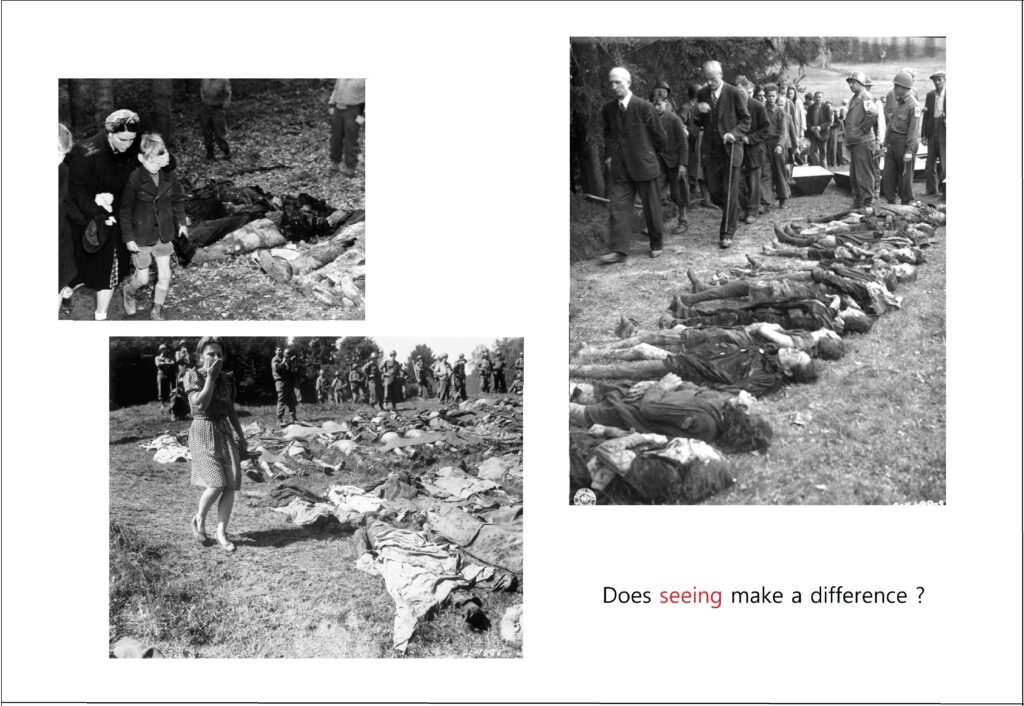
[English below]
Le choc des images ?
Printemps 1945. L’armée américaine force les civils allemands à défiler devant des milliers de cadavres suppliciés. Les soldats veillent à ce que les vaincus constatent de leurs propres yeux les crimes dont ils prétendent n’avoir jamais rien su. Les files sont interminables. On passe la mine fermée, la tête basse. On se bouche le nez, on tente de se cacher le visage, on se retient de vomir. Ni cris d’effroi, ni larmes, le silence est terrible. Il n’y a là que des vieillards, des femmes et des enfants. Les hommes et les adolescents sont tous prisonniers de guerre. Quelques semaines plus tard, l’armée d’occupation organise partout dans les villes, les villages et les camps de prisonniers des séances de cinéma obligatoires. On montre à l’écran des monceaux de corps décharnés retournés par des pelleteuses. La salle, où veillent des sentinelles américaines, reste assez éclairée pour surveiller les spectateurs qui tentent de se boucher les yeux. Le commentaire détaille des atrocités inouïes. Les Américains espèrent par cet électrochoc extirper le venin nazi de millions de cervelles.
La suite a démontré leur naïveté. Ce genre de venin n’est guère sensible aux images.
Les quinze mois qui viennent de s’écouler à Gaza nous ont montré que, même diffusées en direct, les images n’empêchent plus rien.
Does seeing make a difference?
Spring 1945. The American army forced German civilians to march past thousands of tortured corpses. The soldiers made sure that the defeated saw with their own eyes the crimes they claimed to have never known about. The queues were endless. People walked past with their faces closed and their heads down. They held their noses, tried to hide their faces and held back from vomiting. No cries of horror, no tears, the silence was dreadful. There were only old people, women and children. The men and teenagers were prisoners of war. A few weeks later, the occupying army organized compulsory cinema screenings throughout the towns, villages and prison camps. The screen showed piles of corpses turned over by diggers. The theatre, manned by American sentries, remained bright enough to keep an eye on the spectators, who tried to cover their eyes. The commentary detailed unimaginable atrocities. The Americans hoped this electroshock would extract the Nazi venom from millions of brains.
They proved to be naive. This kind of venom is hardly affected by images.
The last fifteen months in Gaza have shown us that, even when broadcast live, images no longer prevent anything.
Marketing Hope
published on : January 7, 2025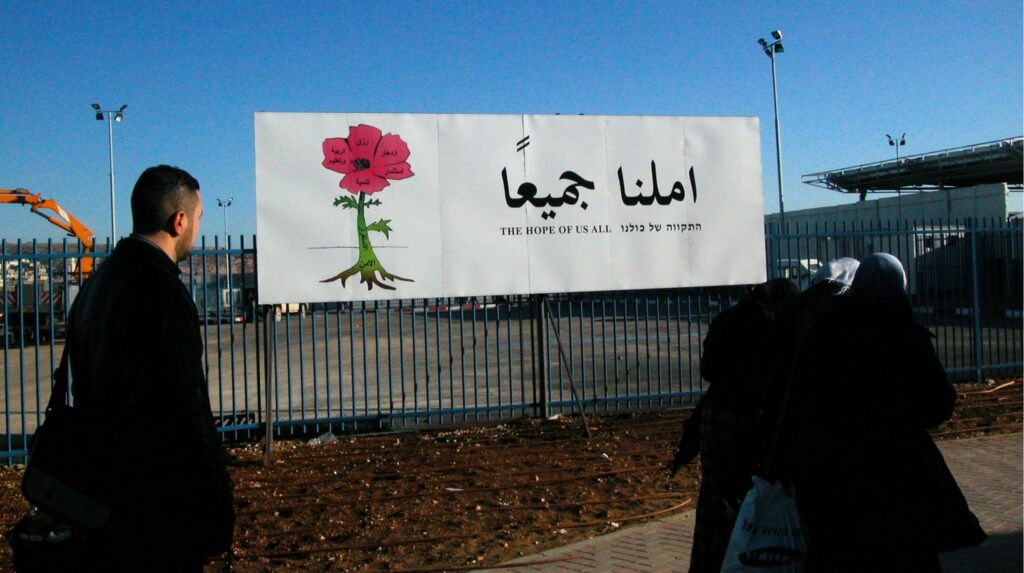
J’ai fait mon sourire de clown et ça a marché. / I did my clown smile and it worked.
published on : December 10, 2024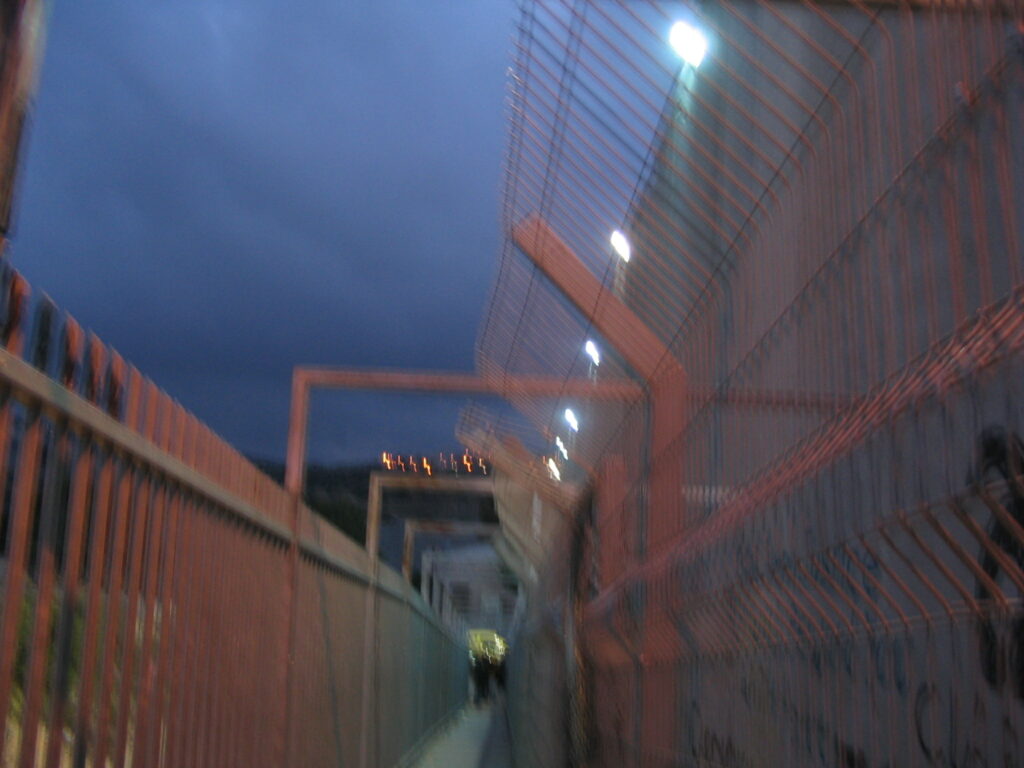
[English translation below]
Journal de bord de Gaza, par Rami Abou Jamous
Mercredi 20 mars
La nuit de lundi à mardi a été terrible, une nuit sanglante sur la ville de Rafah. Des bombardements intensifs ont causé la mort de quinze personnes, en majorité des femmes et des enfants. Les bombes ont commencé à tomber à 17h, tout près de là où on vit. Les enfants – ceux de mon épouse, Sabah, que je considère comme mes propres enfants, et notre fils Walid – ont eu très peur. Walid, qui a deux ans et demi, s’est réveillé pendant la nuit. Il a toujours le même réflexe : il applaudit quand il entend une explosion. Je lui ai appris ça quand on était encore à Gaza-ville, quand ça bombardait 24h/24, 7 jours/7, et quand les vitres se brisaient dans la tour où on habitait. C’était pour lui faire croire que les explosions faisaient partie d’un spectacle, que c’était un feu d’artifice.
Et donc quand les explosions ont commencé lundi, il a applaudi, et il m’a regardé dans les yeux, pour que j’applaudisse avec lui, comme on le faisait avant. Alors je l’ai regardé en souriant et j’ai applaudi. Même chose la nuit, quand il y a eu des bombardements vers 2 heures du matin. J’ai fait mon habituel sourire de clown, et ça a marché. Mais ça ne marche pas avec les autres enfants, qui ont entre 9 et 13 ans. Surtout pour l’aîné, Moaz, qui a très peur des bombes. Il est venu à côté de moi – on dort tous dans la même pièce, sur des matelas, les uns à côté des autres. Je lui ai dit : « Ne t’inquiète pas, c’est loin… » Mais c’est difficile de mentir avec lui, parce qu’il comprend ce qui se passe. J’essaye alors de le convaincre que ça ne va pas arriver jusqu’à nous. Il me demande :
« — Est-ce que ça va se rapprocher ? Est-ce que c’est nous la prochaine cible ? Est-ce que c’est nous la prochaine maison ?
— Mais non, pourquoi ils nous viseraient ? Pourquoi ? On n’a rien à voir avec tout cela.
— Oui, mais tous ceux qui sont morts, ils n’avaient rien à voir non plus. »Il a des amis qui sont morts de la même façon, dont toute la famille a été bombardée. Et tous ces gens n’avaient rien à voir ni avec les factions, ni avec la branche armée du Hamas, ni avec la politique. À chaque fois que je cherche un prétexte, il me répond par des faits. La seule chose que je peux alors dire à Moaz, c’est : « Ne t’inquiète pas, Dieu nous protège, il ne va rien se passer. Dans quelques années, on sourira de tout cela. On dira : ” Tu te rappelles quand tu t’es réveillé et que tu as eu peur ?” »
Le problème, c’est que je n’arrive pas toujours à le convaincre. Le pire, c’est quand il me dit : « Mais je crois qu’ils ont déjà visé des journalistes, et toi tu es un journaliste. » Et là je ne peux pas répondre grand-chose. Je dis : « Ne t’inquiète pas, je suis journaliste, mais je ne suis pas une vedette. D’habitude, ils visent des stars, et moi je suis juste un petit journaliste. J’essaie juste de faire mon boulot. Je ne suis pas assez connu pour qu’ils me visent. Je ne suis pas un danger pour les Israéliens. » Et Moaz de me regarder toujours sans trop y croire.
Jeudi 2 mai
Comme vous savez, j’ai appris à Walid à applaudir quand il entend un bombardement, pour lui faire croire que c’est une sorte de jeu. Lundi, il a applaudi plusieurs fois, très fort. Cette fois, ça m’a vraiment fait peur. Les bombes tombaient tout autour de nous. Ça s’est intensifié. Ça m’a fait peur parce qu’on parle d’un cessez-le-feu qui se rapproche. Et on sait très bien que quand il y a une annonce de cessez-le-feu, la guerre s’intensifie dans les dernières heures qui précèdent.
Dimanche 26 mai
Hier, j’ai vu mon petit Walid courir après les chats, cherchant à les frapper avec un bâton. Je me suis aperçu que son caractère changeait. Sabah, ma femme, m’a montré les vidéos qu’on prenait de lui au début de la guerre, où il caressait les chats et leur faisait des bisous. Avant, il était proche des animaux.
Sa voix non plus n’est plus la même. Avant, il parlait très doucement. Aujourd’hui, il s’exprime souvent en parlant très fort, même pour dire des choses banales. Est-ce à cause de ces presque huit mois de guerre que la violence monte en lui ? Je le crois. J’ai constaté la même chose chez les enfants de mes amis. Et je pense que ce changement va rester au moins un bon moment. Je croyais pouvoir protéger mon fils en lui faisant croire que tout ce qu’il se passe est une sorte de cirque. Quand les Israéliens bombardent, on applaudit ensemble, comme si c’était un jeu, et comme si les applaudissements éloignaient le danger. Mais nous ne vivons pas seul, et Walid voit bien que les autres ont peur, qu’ils sursautent, qu’ils crient et qu’ils rentrent chez eux en courant. Il comprend que le danger est toujours là.
Rami Abou Jamous, fondateur de GazaPress, a reçu en octobre 2024 le prix Bayeux des correspondants de guerre. Depuis février 2024, son “Journal de bord de Gaza” est publié en ligne par Orient XXI. Il vient de paraître en livre (pas encore traduit) grâce aux éditions Libertalia. Depuis le 7 octobre 2023, plus de 140 journalistes palestiniens sont morts.
Gaza Diary, by Rami Abou Jamous
Wednesday March 20th
Monday night was a terrible, bloody night in the town of Rafah. Intensive bombardment caused the death of fifteen people, most of them women and children. The bombs started falling at 5pm, very close to where we live. The children – those of my wife, Sabah, whom I consider my own children, and our son Walid – were very scared. Walid, who is two and a half, woke up during the night. He still has the same reflex: he applauds when he hears an explosion. I taught him this when we were still in Gaza City, when the bombing was going on 24/7, and when the windows were breaking in the tower block where we lived. It was to make him believe that the explosions were part of a show, that it was a firework display.
So when the explosions started on Monday, he applauded and looked me in the eye so that I would applaud with him, as we used to do. So I looked at him, smiled and applauded. The same thing happened at night, when there were bombings at around 2am. I did my usual clown smile, and it worked. But it didn’t work with the other children, who are between 9 and 13. Especially for the eldest, Moaz, who is very scared of bombs. He came next to me – we all sleep in the same room, on mattresses, next to each other.
I told him: ‘Don’t worry, it’s a distance…’. But it’s hard to lie to him, because he understands what’s going on. So I try to convince him that it’s not going to reach us. He asks me: ‘Will it get any closer? Are we the next target? Are we the next house? – No, why would they target us? Why should they? We’ve got nothing to do with all that. – Yes, but all those who died, they had nothing to do with it either.’
He has friends who died in the same way, whose whole family was bombed. And all these people had nothing to do either with the factions, or with the armed wing of Hamas, or with politics.” Every time I look for a pretext, he replies with facts. The only thing I can tell Moaz is: ‘Don’t worry, God is protecting us, nothing is going to happen. In a few years’ time, we’ll be smiling about all this. They’ll say: ‘Do you remember when you woke up and you were scared?“
The problem is that I can’t always convince him. The worst is when he says to me: ‘But I think they’ve already targeted journalists, and you’re a journalist’. And then I can’t say much. I say: ‘Don’t worry, I’m a journalist, but I’m not a star. Usually, they go for stars, and I’m just a small journalist. I’m just trying to do my job. I’m not famous enough for them to target me. I’m not a danger to the Israelis.” And Moaz is still looking at me without really believing it.
Thursday May 2nd
As you know, I taught Walid to clap when he hears a bombing, to make him think it’s some kind of game. On Monday, he clapped several times, very loudly. This time it really scared me. The bombs were falling all around us. It intensified. It scared me because we’re talking about a near ceasefire. And we all know very well that when there’s an announcement of a ceasefire, the war intensifies in the last few hours beforehand.
Sunday May 26th
Yesterday, I saw my little Walid running after cats, trying to hit them with a stick. I noticed that his character was changed. Sabah, my wife, showed me the videos we took of him at the start of the war, where he would stroke the cats and give them kisses. He used to be close to animals.
His voice isn’t the same either. He used to speak very softly. Now he often speaks very loudly, even to say the most banal things. Is it because of these almost eight months of war that the violence is rising in his voice? I think so. I’ve seen the same thing in my friends’ children. And I think this change is going to last for a while at least. I thought I could protect my son by making him believe that everything that was happening was some kind of circus. When the Israelis bomb, we applaud together, as if it were a game, and as if the applause kept the danger away. But we don’t live alone, and Walid can see that the others are scared, that they jump up, shout and run home. He understands that the danger is always there.” [ Translation Anne Brunswic]
Rami Abou Jamous is the founder of GazaPress. His ‘Gaza Diary’ has been published online by Orient XXI since February 2024. It is now a book (not yet translated) published by Libertalia. Rami Abou Jamous was awarded the Bayeux Prize for war correspondents in October 2024. More than 140 Palestinian journalists have died since 7 October 2023.
Beware of security / Gare à la sécurité
published on : November 24, 2024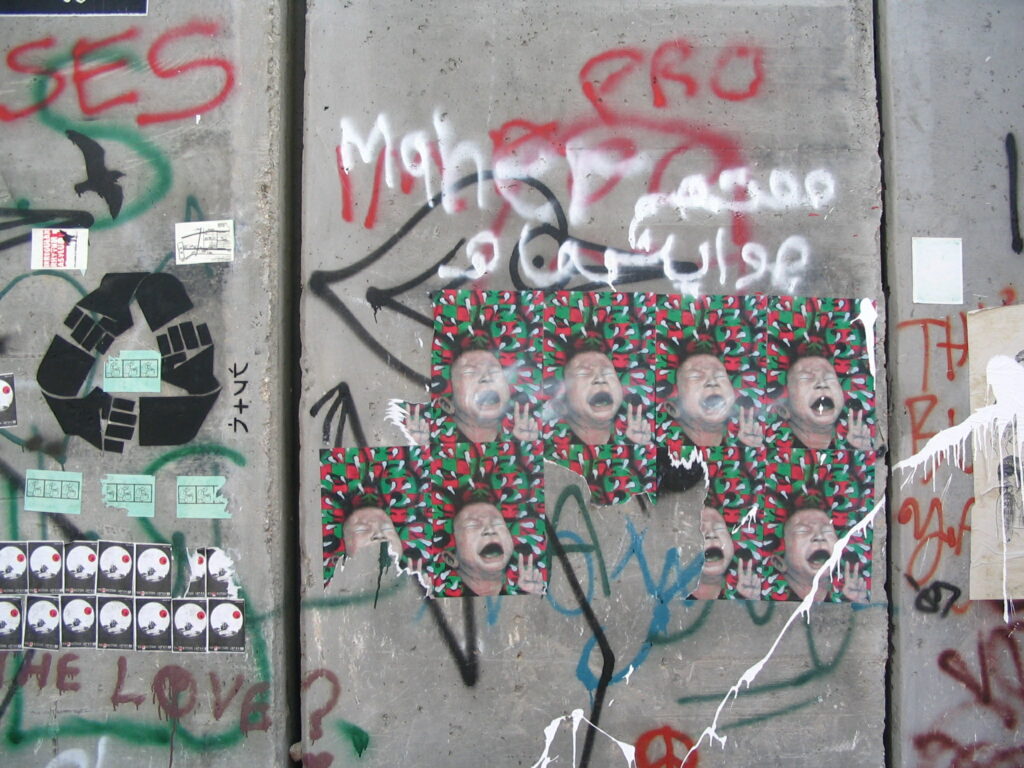
[English translation below]
Gare à la sécurité. C’est une pièce à deux faces, voire trois.
Côté pile. Quel beau programme ! Sécurité sociale universelle. Car de l’insécurité, je, tu, il, elle souffre et souvent meurt. La femme, l’enfant, l’infirme, l’ouvrier, l’immigrant, le civil exposé à la terreur qui tue, affame, empoisonne, ensevelit, tous réclament la sécurité. Tous ont soif de sécurité. Personne ne peut se coucher avec la certitude qu’il sera vivant demain, écrit un chroniqueur de Gaza.
Côté face. La citadelle assiégée ou son modèle réduit, la villa dans la jungle a pour premier, second et troisième souci leur propre sécurité. La villa exige de hauts grillages, jamais assez hauts. Mieux, elle doit dissuader les assaillants qui se dissimulent parmi les fourrés et les hautes branches. La sécurité des uns exige la mise en cage des autres, voire leur extermination. En hébreu, « sécurité » se dit « bitakhon ». « Barrière de sécurité » se dit en arabe « mur de l’apartheid ». A mes oreilles, les trois syllabes bi-ta-khon crachées par un bonhomme vert dans un mégaphone sonnent comme l’ouverture de la chasse.
La sécurité pour tous, grands et petits, porte un nom, la paix dans le droit, dans la justice. Cette paix-là, le fort l’écarte avec dédain. Il n’aura jamais assez de garanties, d’assurances, dit-il. Le vrai : il n’entend pas donner de garanties au faible. Pas question de poser des bornes à sa puissance. « J’ai bien le droit », dit-il, au mépris du droit.
La sécurité des uns n’est pas celle des autres. Étendard de la réaction. Tenants de l’ordre établi contre subversifs. Sécurité des investissements, sécurité du propriétaire, sécurité des institutions. Caméras de sécurité, agents de sécurité, prisons de haute sécurité, forces de l’ordre, murailles et barbelés, patrouilles en mer. A ce jeu, le dictateur a toujours une longueur d’avance. Il fait mieux qu’assurer la sécurité, il l’impose. A son bénéfice exclusif.
Il y aurait une fois. Sécurité de la rue qu’on emprunte à la nuit tombée, de la route qu’on traverse, de ce qu’on mange, boit, respire. Sécurité de la terre nourricière. Sécurité pour ceux qui ont soif, qui ont faim, qui vivent dans des logements insalubres ou pas de logement du tout, qui traversent les mers et les continents.
Et puis la sécurité des paroles que l’on confie, des bras où l’on se blottit.
Beware of security. It’s a two-sided, or even a three-sided coin.
Tails side. What a great programme! Universal social security. Because of insecurity, I, you, he, she suffers and often dies. Women, children, the disabled, workers, immigrants, civilians exposed to the terror that kills, starves, poisons and buries – they all want security. They all thirst for security. No one can go to bed with the certainty that they will be alive in the morning’, writes a Gaza columnist.
The opposite side. The first, second and third concern of the besieged citadel or its reduced model, the villa in the jungle, is its own safety. The villa requires high fences, never high enough. Better yet, it must dissuade attackers who hide among the thickets and high branches. The security of some requires the caging of others, even their extermination. In Hebrew, ‘security’ is called ‘bitakhon’. ‘Security fence’ is Arabic for “apartheid wall”. To my ears, the three syllables bi-ta-khon shouted by a green man into a megaphone sound like the opening of the hunt.
Security for all, young and old, has a name: peace based on law and justice. The strong dismiss this peace with disdain. He’ll never have enough guarantees, enough assurances, he says. The truth is that he has no intention of giving guarantees to the weak. There is no intention of placing limits on his power. ‘I have the right’, he says, in defiance of the law.
The security of some is not the security of others. Standard of reaction. Defenders of the established order versus the subversive. Investment security, owner security, institutional security. Security cameras, security guards, high-security prisons, forces of law and order, walls and barbed wire, patrols at sea. At this game, the dictator is always one step ahead. He does more than ensure security, he imposes it. To his exclusive benefit.
There would be a time. Security of the street you walk down at nightfall, of the road you cross, of what you eat, drink and breathe. Security in the soil that nourishes us all. Security for those who are thirsty, hungry, living in substandard housing or no housing at all, for those who cross seas and continents.
And then the security of the words we confide, the arms in which we cuddle.
Gare à la sécurité. C’est une pièce à deux faces, voire trois.
Côté pile. Quel beau programme ! Sécurité sociale universelle. Car de l’insécurité, je, tu, il, elle souffre et souvent meurt. La femme, l’enfant, l’infirme, l’ouvrier, l’immigrant, le civil exposé à la terreur qui tue, affame, empoisonne, ensevelit, tous réclament la sécurité. Tous ont soif de sécurité. Personne ne peut se coucher avec la certitude qu’il sera vivant demain, écrit un chroniqueur de Gaza.
Côté face. La citadelle assiégée ou son modèle réduit, la villa dans la jungle a pour premier, second et troisième souci leur propre sécurité. La villa exige de hauts grillages, jamais assez hauts. Mieux, elle doit dissuader les assaillants qui se dissimulent parmi les fourrés et les hautes branches. La sécurité des uns exige la mise en cage des autres, voire leur extermination. En hébreu, « sécurité » se dit « bitakhon ». « Barrière de sécurité » se dit en arabe « mur de l’apartheid ». A mes oreilles, les trois syllabes bi-ta-khon crachées par un bonhomme vert dans un mégaphone sonnent comme l’ouverture de la chasse.
La sécurité pour tous, grands et petits, porte un nom, la paix dans le droit, dans la justice. Cette paix-là, le fort l’écarte avec dédain. Il n’aura jamais assez de garanties, d’assurances, dit-il. Le vrai : il n’entend pas donner de garanties au faible. Pas question de poser des bornes à sa puissance. « J’ai bien le droit », dit-il, au mépris du droit.
La sécurité des uns n’est pas celle des autres. Étendard de la réaction. Tenants de l’ordre établi contre subversifs. Sécurité des investissements, sécurité du propriétaire, sécurité des institutions. Caméras de sécurité, agents de sécurité, prisons de haute sécurité, forces de l’ordre, murailles et barbelés, patrouilles en mer. A ce jeu, le dictateur a toujours une longueur d’avance. Il fait mieux qu’assurer la sécurité, il l’impose. A son bénéfice exclusif.
Il y aurait une fois. Sécurité de la rue qu’on emprunte à la nuit tombée, de la route qu’on traverse, de ce qu’on mange, boit, respire. Sécurité de la terre nourricière. Sécurité pour ceux qui ont soif, qui ont faim, qui vivent dans des logements insalubres ou pas de logement du tout, qui traversent les mers et les continents.
Et puis la sécurité des paroles que l’on confie, des bras où l’on se blottit.
Biography
Anne Brunswic is a French author whose work encompasses various forms of expression: journalism, non-fiction literature, documentary film, radio creative production and photography. She spent a long time in the occupied territories of Palestine, in Siberia and the far north of Russia. She has a long-standing commitment to the voiceless and the rightsless. Just published “Women in gulag” in Kometa review. Online now a 5 episodes podcast on Radio Suisse romande, Histoire vivante (in French) about the unknown Argentine soldiers of Falklands/Malvinas war. annebrunswic.fr